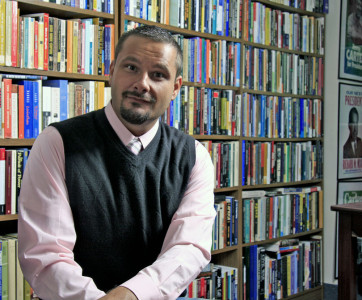NSU Newsroom
SharkBytes
Horizons
This version of NSU News has been archived as of February 28, 2019. To search through archived articles, visit nova.edu/search. To access the new version of NSU News, visit news.nova.edu.
This version of SharkBytes has been archived as of February 28, 2019. To search through archived articles, visit nova.edu/search. To access the new version of SharkBytes, visit sharkbytes.nova.edu.
How ISIS Came to Be and Why It Must Be Stopped

FORT LAUDERDALE-DAVIE, Fla. – On September 11, 2001 Islamic fundamentalism became a permanent and unwanted fixture in our lives. We thought with the death of Osama bin Laden and our military withdrawals from Iraq and Afghanistan, we would return to the way things were on September 10, 2001. Unfortunately, ISIS has made this impossible. They are more organized and militarized than Al Qaida, and more deadly than the Taliban. ISIS is still in its infancy and as soon as they finish consolidating their power they will be stronger and more deadly than both Al Qaida and the Taliban combined.
Our foreign policy had a role in the formation and militarization of ISIS and like Dr. Frankenstein’s monster, only the creator of that monster has the ability to contain and stop it. The role we had in the formation of ISIS was not intentional. When our politicians called for the democratization of Iraq, they failed to realize that the Western model of democracy would not work because of religion. The Shias are a minority in the Islamic world and have faced 1,500 years of intolerance, repression, and persecution at the hands of a Sunni majority. For 700 of those years, the Islamic world was dominated by the Ottoman Empire, which was controlled by the Sunnis who ensured the social and political subjugation of the Shia people. Iraq was part of the Ottoman Empire; however, the population was majority Shia. In other words, Iraq was a minority-controlled society. This did not change under British occupation or the rise and power consolidation of Saddam Hussein. During our invasion we helped facilitate the creation of a majoritarian democracy and in a majoritarian democracy, the majority has absolute power and can create any legislation they wish to repress the minority, which is what the Iraqi Shia did. The Sunni population was waiting for someone or something to be their liberator and they found this in ISIS.
While this was happening, Syria was falling into a civil war where a repressive Shia dictator, who represented a Shia minority, was fighting against the Sunni majority. Historically, the Christian minority sided with the Shia minority in Syria and the Sunni majority looked at both as their repressor. What further complicates this situation was the death of Osama bin Laden, which resulted in Al Qaida splintering apart. Think of a crystal vase and view Al Qaida under bin Laden as the vase and with his death the vase shattered. Those shards of glass had no real power; however, this all changed with the Syrian civil war because those pieces found their way to Syria and this is how ISIS was formed.
What further complicates the situation is that ISIS has a significant Western membership. Many disillusioned, poor and repressed young European Muslim men went to Syria to join ISIS. When ISIS moved into Iraq, the Sunni population saw them as their liberator from the majoritarian democracy we created.
If we do not stop ISIS, they will control the oil found in the Sunni territories, they will continue to have the advanced American weaponry that deserting Iraqi soldiers left, and they will have the backing of an angry Sunni population seeking vengeance on the Shia majority and us for taking their political power. Think about what this could mean. Al Qaida and Taliban did not have oil, they did not have advanced American weaponry, and they did not have an angry population supporting them. We must stop ISIS. If not, I fear the destruction and violence we have faced since September 11 will be just the beginning.
Dustin Berna, Ph.D.
Nova Southeastern University
About the Author: Dustin Berna, Ph.D., is an assistant professor of Conflict Resolution and Political Science at Nova Southeastern University’s GraduateSchool of Humanities and Social Sciences (SHSS.) He is also the Director of Assessment and Planning for NSU’s Graduate School of Humanities and Social Sciences.
Berna’s research specializations include Middle Eastern politics, Islamic fundamentalism, religious extremism, social movements, terrorism, and political institutions. He has taught classes on the Iraq War, Islamic politics, Middle Eastern politics, terrorism, political violence, international relations, U.S. foreign policy, the politics of developing states, revolutions, international negotiation and violence prevention. Berna has written numerous articles on topics that range from terrorism and Islamic fundamentalism to Iranian political institutions and Islamic democracy. Berna has experience working with print and broadcast media.
Berna earned his doctorate from the University of New Orleans in 2008. His two major fields of study were Middle Eastern politics and international relations. American political institutions were third and minor field. His dissertation was a quantitative study that evaluated the causes and electoral success of Islamic fundamentalist movements. Berna has collected and coded every Islamic fundamentalist group that is, or has been, in operation in the Islamic world since 1970.